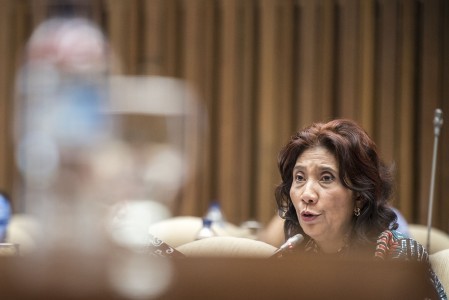Popular Reads
Top Results
Can't find what you're looking for?
View all search resultsPopular Reads
Top Results
Can't find what you're looking for?
View all search resultsSettling maritime borders a tough job
Why is it so difficult to define maritime boundaries?
Change text size
Gift Premium Articles
to Anyone
D
uring an official visit to Nunukan, East Kalimantan, last month, Ambassador Eddy Pratomo, the President’s special envoy for the determination of Indonesia-Malaysia maritime boundaries, said the two countries were working hard toward the definition of “fence” in the seas between them and some progress had been made.
Ambassador Pratomo’s appointment two years ago itself indicates the importance of the borders between the two Southeast Asian neighbors. Indonesia has 10 neighbors to deal with to settle maritime boundaries, and President Joko “Jokowi” Widodo appointed a special envoy only for Indonesia-Malaysia sea borders. This might also show the complexity and sensitivity of the issue.
The first maritime boundary segment between Indonesia and Malaysia was settled in 1969 and nearly half a decade later, the borders have yet to be finalized. Similarly, negotiation on maritime boundaries between Indonesia and Singapore lasted more than 40 years even though it was only for a relatively short distance.
With Vietnam, Indonesia took around 25 years to settle maritime boundaries dividing the seabed between them. A similar lengthy process also applied to the IndonesiaPhilippines maritime boundary that was agreed upon in 2014.
A layman would comment that defining boundaries between Indonesia and its neighbors should not be so complicated. “All have been clearly regulated,” he may say. “Each country is entitled to 12 nautical miles of territorial sea, 200 nautical miles of exclusive economic zone (EEZ), etcetera. Why doesn’t the government just settle it? When Indonesia’s entitlement overlaps with that of another’s, just divide by two. Same distance. Easy!”
Many Indonesians would share that view. All have been set by the United Nations Convention on the Law of the Sea (UNCLOS), but why is it so difficult to define maritime boundaries?
Sea boundary delimitation is required when maritime entitlement between two countries overlaps one another. This is simply because the maritime space between two countries is not large enough for the two countries to claim the entire maritime zones as permitted by UNCLOS.


















